
qa-mdt
OpenMusic: SOTA Text-to-music (TTM) Generation
Stars: 451
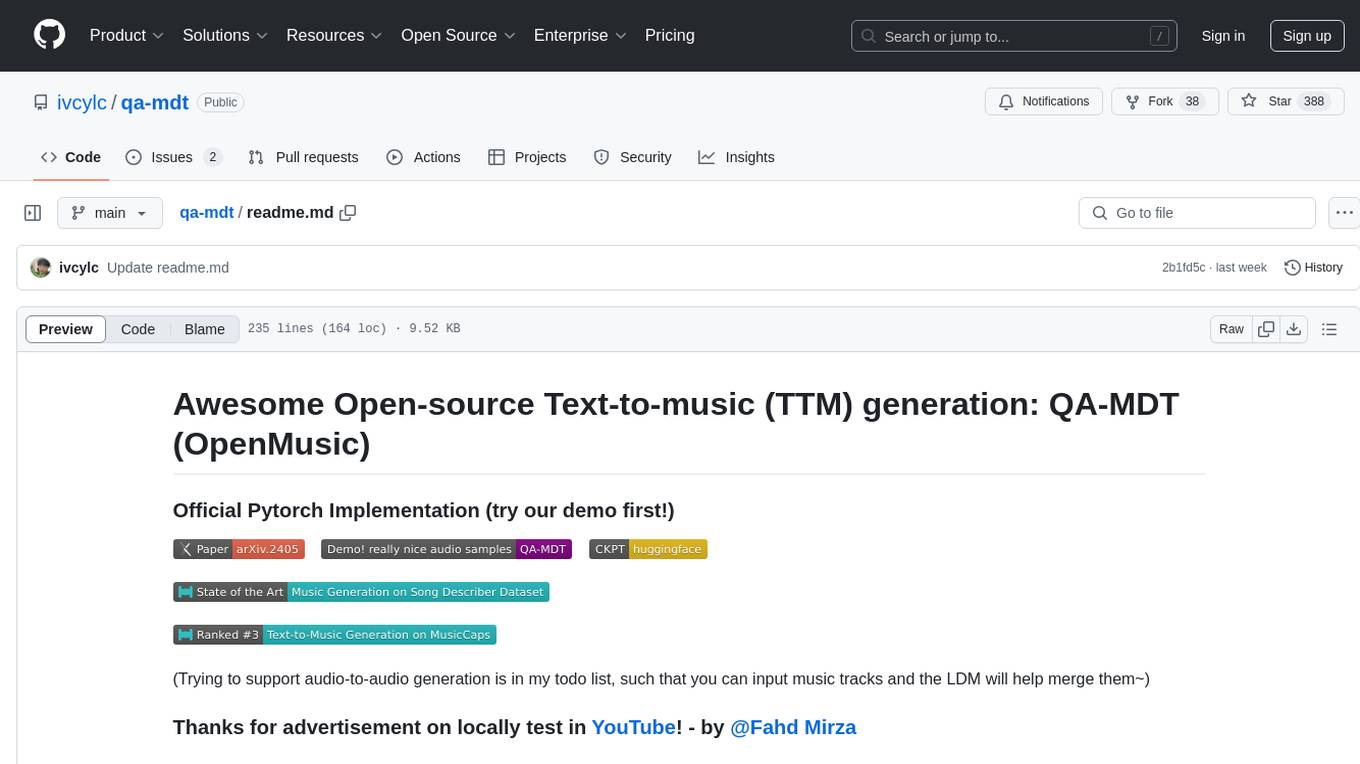
This repository provides an implementation of QA-MDT, integrating state-of-the-art models for music generation. It offers a Quality-Aware Masked Diffusion Transformer for enhanced music generation. The code is based on various repositories like AudioLDM, PixArt-alpha, MDT, AudioMAE, and Open-Sora. The implementation allows for training and fine-tuning the model with different strategies and datasets. The repository also includes instructions for preparing datasets in LMDB format and provides a script for creating a toy LMDB dataset. The model can be used for music generation tasks, with a focus on quality injection to enhance the musicality of generated music.
README:
(Trying to support audio-to-audio generation is in my todo list, such that you can input music tracks and the LDM will help merge them~)
Thanks for advertisement on locally test in YouTube! - by @Fahd Mirza
Diffusers Implementation 🧨 - by @jadechoghari - Hugging Face 🤗.
Setting up is super easy! Just follow the instructions below:
pip install -r gradio/requirements.txt
python gradio/gradio_app.py
We have to admit that the Unet architecture still has some probability advantage in subjective musicality, but this is not measured in the metric. And, we did have some models that were better on the metric, or trained for longer, but we observed that the models generally became less musicality after training too long, so we picked a model that was moderate on the metric as an open source sample. If you need more models (extreme metric pursuit or extreme musically pursuit, please contact me)
without any fancy design, just a quality injection, and enjoy your beautiful music
Down the main checkpoint of our QA-MDT model from https://huggingface.co/lichang0928/QA-MDT
For chinese users, you can also download your checkpoint through following link:
https://pan.baidu.com/s/1N0XqVxtF_x9I7fWb07LPqw?pwd=9nkt
This repository provides an implementation of QA-MDT, integrating state-of-the-art models for music generation. The code and methods are based on the following repositories:
Python 3.10
qamdt.yamlBefore training, you need to download extra ckpts needed in ./audioldm_train/config/mos_as_token/qa_mdt.yaml and offset_pretrained_checkpoints.json
Noted that: All above checkpoints can be downloaded from:
sh run.shOur model is already well-pretrained. If you wish to retrain or fine-tune it, you can choose to use or not use our QA strategy. We offer several training strategies:
-
MDT w.o quality token:
PixArt_MDT -
MDT with quality token:
Pixart_MDT_MOS_AS_TOKEN -
DiT:
PixArt_Slow -
U-net w / w.o quality prefix:
you can just follow AudioLDM and make your dataset as illustrated in our paper (method part)
To train or fine-tune, simply change "Your_Class" in audioldm_train.modules.diffusionmodules.PixArt.Your_Class in our config file.
you can also try modifying the patch size, overlap size for your best performance and computing resources trade off (see our Appendix in arXiv paper)
We use the LMDB dataset format for training. You can modify the dataloader according to your own training needs.
If you'd like to follow our process (though we don't recommend it, as it can be complex), here's how you can create a toy LMDB dataset:
-
Create a Proto File
First, create a file named
datum_all.protowith the following content:syntax = "proto2"; message Datum_all { repeated float wav_file = 1; required string caption_original = 2; repeated string caption_generated = 3; required float mos = 4; }
-
Generate Python Bindings
(Your protoc version should be 3.4, and you can download it here)
Run the following command in your terminal to generate Python bindings:
protoc --python_out=./ datum_all.protoThis will create a file called datum_all_pb2.py. We have also provided this file in our datasets folder, and you can check if it matches the one you generated. Never attempt to modify this file, as doing so could cause errors.
- Code for Preparing a toy LMDB Dataset
The following Python script demonstrates how to prepare your dataset in the LMDB format:
import torch
import os
import lmdb
import time
import numpy as np
import librosa
import os
import soundfile as sf
import io
from datum_all_pb2 import Datum_all as Datum_out
device = 'cpu'
count = 0
total_hours = 0
# Define paths
lmdb_file = '/disk1/changli/toy_lmdb'
toy_path = '/disk1/changli/audioset'
lmdb_key = os.path.join(lmdb_file, 'data_key.key')
# Open LMDB environment
env = lmdb.open(lmdb_file, map_size=1e12)
txn = env.begin(write=True)
final_keys = []
def _resample_load_librosa(path: str, sample_rate: int, downmix_to_mono: bool, **kwargs):
"""Load and resample audio using librosa."""
src, sr = librosa.load(path, sr=sample_rate, mono=downmix_to_mono, **kwargs)
return src
start_time = time.time()
# Walk through the dataset directory
for root, _, files in os.walk(toy_path):
for file in files:
audio_path = os.path.join(root, file)
key_tmp = audio_path.replace('/', '_')
audio = _resample_load_librosa(audio_path, 16000, True)
# Create a new Datum object
datum = Datum_out()
datum.wav_file.extend(audio)
datum.caption_original = 'audio'.encode()
datum.caption_generated.append('audio'.encode())
datum.mos = -1
# Write to LMDB
txn.put(key_tmp.encode(), datum.SerializeToString())
final_keys.append(key_tmp)
count += 1
total_hours += 1.00 / 60 / 10
if count % 1 == 0:
elapsed_time = time.time() - start_time
print(f'{count} files written, time: {elapsed_time:.2f}s')
txn.commit()
txn = env.begin(write=True)
# Finalize transaction
try:
total_time = time.time() - start_time
print(f'Packing completed: {count} files written, total_hours: {total_hours:.2f}, time: {total_time:.2f}s')
txn.commit()
except:
pass
env.close()
# Save the LMDB keys
with open(lmdb_key, 'w') as f:
for key in final_keys:
f.write(key + '\n')-
Input your generated lmdb path and its corresponding key file path into the config
-
Start your training
sh infer/infer.sh
# you may change the infer.sh for witch quality level you want to infer
# defaultly, it should be set to 5 which represent highest quality
# Additionally, it may be useful to change the prompt with text prefix "high quality",
# which match the training process and may further improve performanceThis is the first time I open source such a project, the code, the organization, the open source may not be perfect. If you have any questions about our model, code and datasets, feel free to contact me via below links, and I'm looking forward to any suggestions:
- Email: [email protected]
- WeChat: 19524292801
I will try my best to provide more projects on music and audio in the future ~
If you find this project useful, please consider citing:
@article{li2024quality,
title={Quality-aware Masked Diffusion Transformer for Enhanced Music Generation},
author={Li, Chang and Wang, Ruoyu and Liu, Lijuan and Du, Jun and Sun, Yixuan and Guo, Zilu and Zhang, Zhenrong and Jiang, Yuan},
journal={arXiv preprint arXiv:2405.15863},
year={2024}
}
For Tasks:
Click tags to check more tools for each tasksFor Jobs:
Alternative AI tools for qa-mdt
Similar Open Source Tools

qa-mdt
This repository provides an implementation of QA-MDT, integrating state-of-the-art models for music generation. It offers a Quality-Aware Masked Diffusion Transformer for enhanced music generation. The code is based on various repositories like AudioLDM, PixArt-alpha, MDT, AudioMAE, and Open-Sora. The implementation allows for training and fine-tuning the model with different strategies and datasets. The repository also includes instructions for preparing datasets in LMDB format and provides a script for creating a toy LMDB dataset. The model can be used for music generation tasks, with a focus on quality injection to enhance the musicality of generated music.
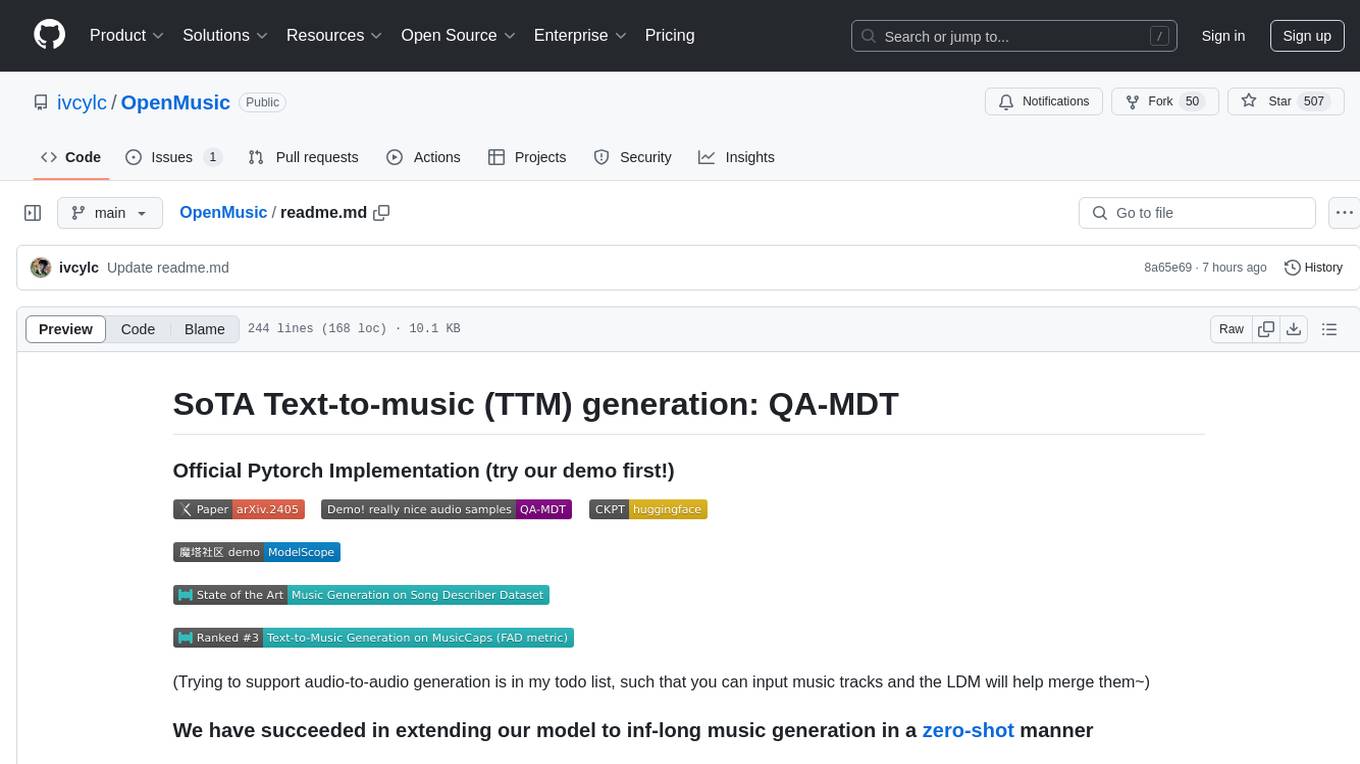
OpenMusic
OpenMusic is a repository providing an implementation of QA-MDT, a Quality-Aware Masked Diffusion Transformer for music generation. The code integrates state-of-the-art models and offers training strategies for music generation. The repository includes implementations of AudioLDM, PixArt-alpha, MDT, AudioMAE, and Open-Sora. Users can train or fine-tune the model using different strategies and datasets. The model is well-pretrained and can be used for music generation tasks. The repository also includes instructions for preparing datasets, training the model, and performing inference. Contact information is provided for any questions or suggestions regarding the project.
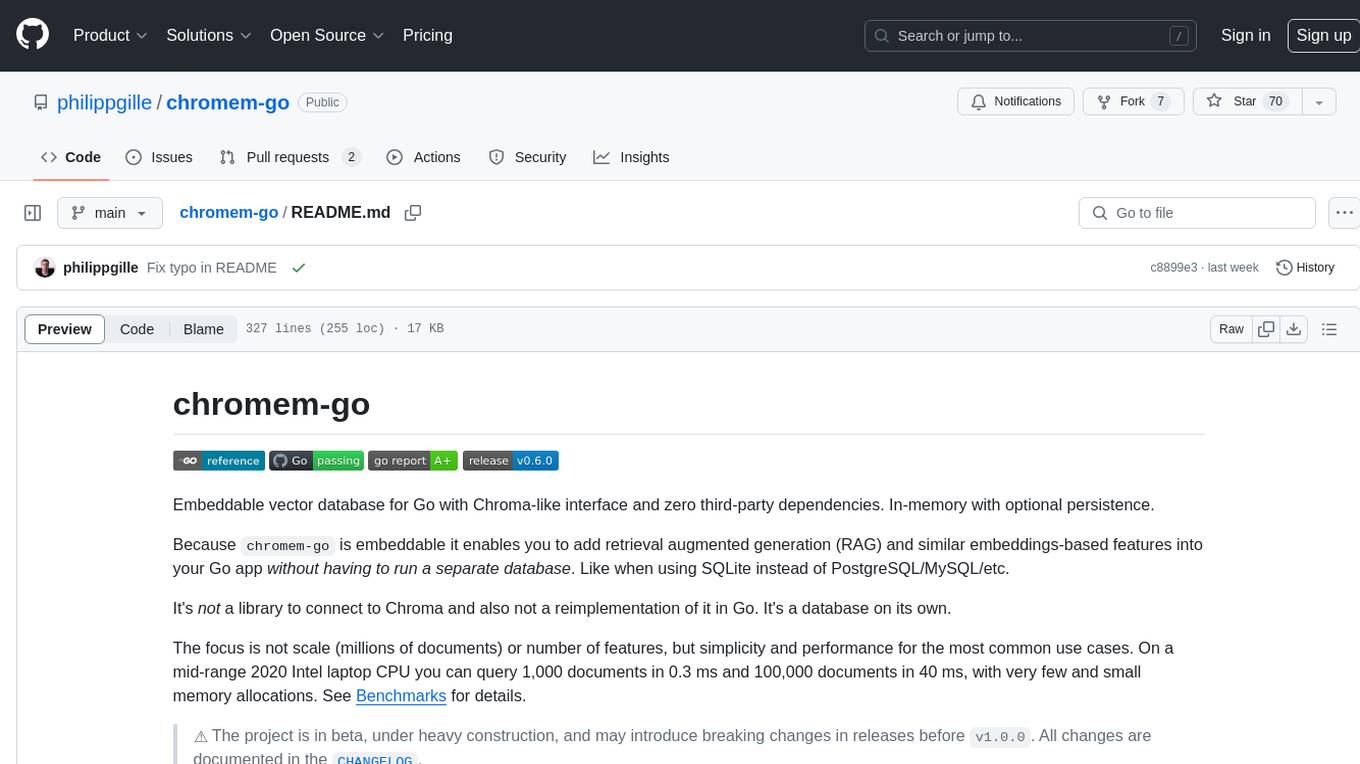
chromem-go
chromem-go is an embeddable vector database for Go with a Chroma-like interface and zero third-party dependencies. It enables retrieval augmented generation (RAG) and similar embeddings-based features in Go apps without the need for a separate database. The focus is on simplicity and performance for common use cases, allowing querying of documents with minimal memory allocations. The project is in beta and may introduce breaking changes before v1.0.0.
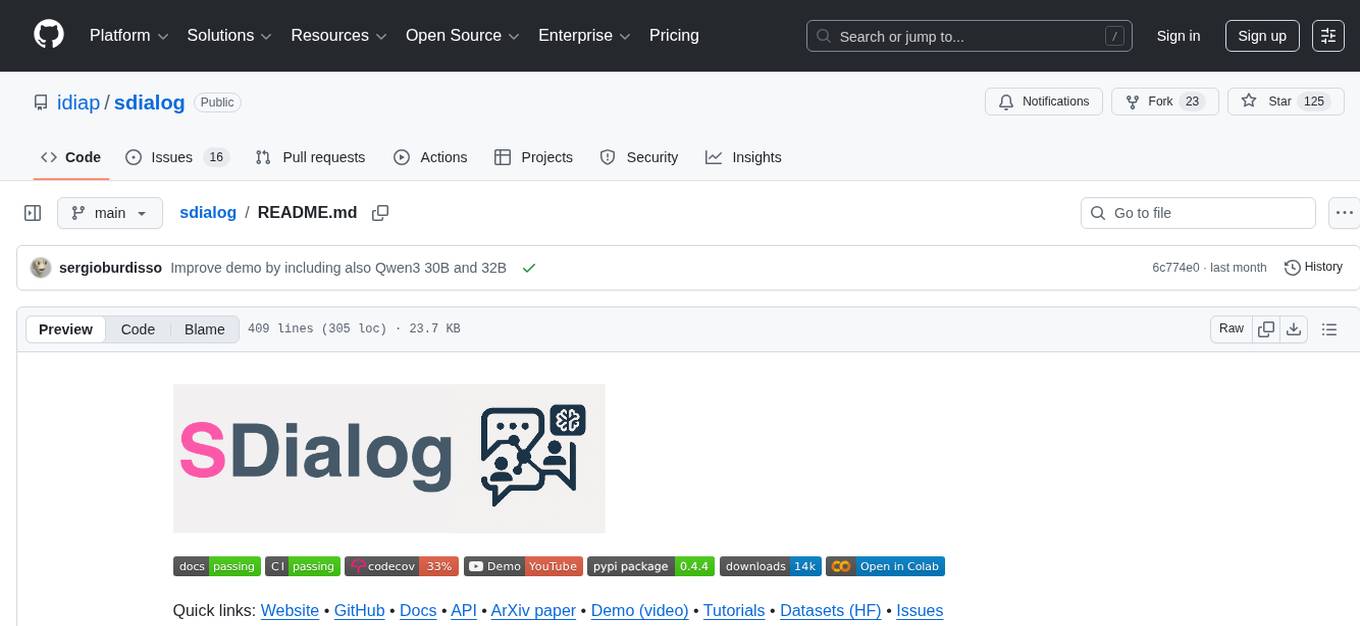
sdialog
SDialog is an MIT-licensed open-source toolkit for building, simulating, and evaluating LLM-based conversational agents end-to-end. It aims to bridge agent construction, user simulation, dialog generation, and evaluation in a single reproducible workflow, enabling the generation of reliable, controllable dialog systems or data at scale. The toolkit standardizes a Dialog schema, offers persona-driven multi-agent simulation with LLMs, provides composable orchestration for precise control over behavior and flow, includes built-in evaluation metrics, and offers mechanistic interpretability. It allows for easy creation of user-defined components and interoperability across various AI platforms.

rl
TorchRL is an open-source Reinforcement Learning (RL) library for PyTorch. It provides pytorch and **python-first** , low and high level abstractions for RL that are intended to be **efficient** , **modular** , **documented** and properly **tested**. The code is aimed at supporting research in RL. Most of it is written in python in a highly modular way, such that researchers can easily swap components, transform them or write new ones with little effort.
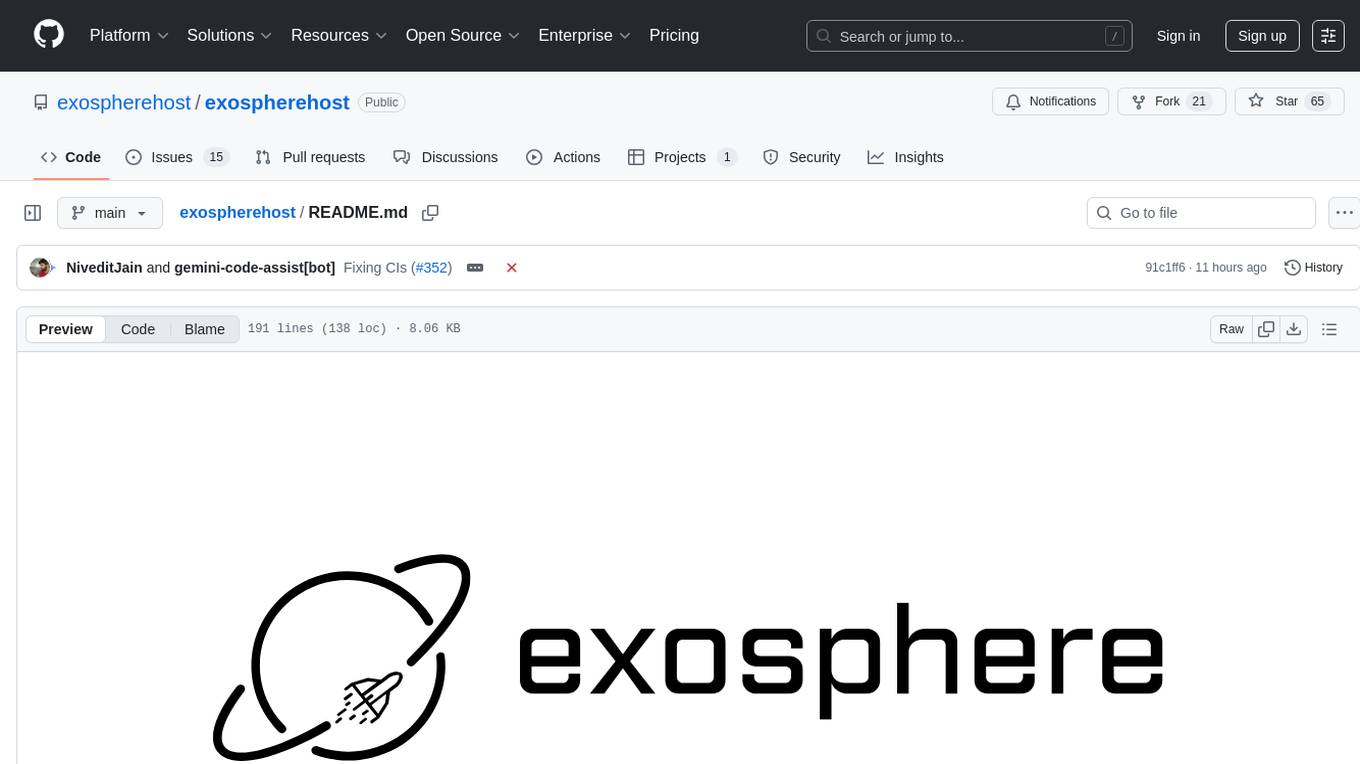
exospherehost
Exosphere is an open source infrastructure designed to run AI agents at scale for large data and long running flows. It allows developers to define plug and playable nodes that can be run on a reliable backbone in the form of a workflow, with features like dynamic state creation at runtime, infinite parallel agents, persistent state management, and failure handling. This enables the deployment of production agents that can scale beautifully to build robust autonomous AI workflows.
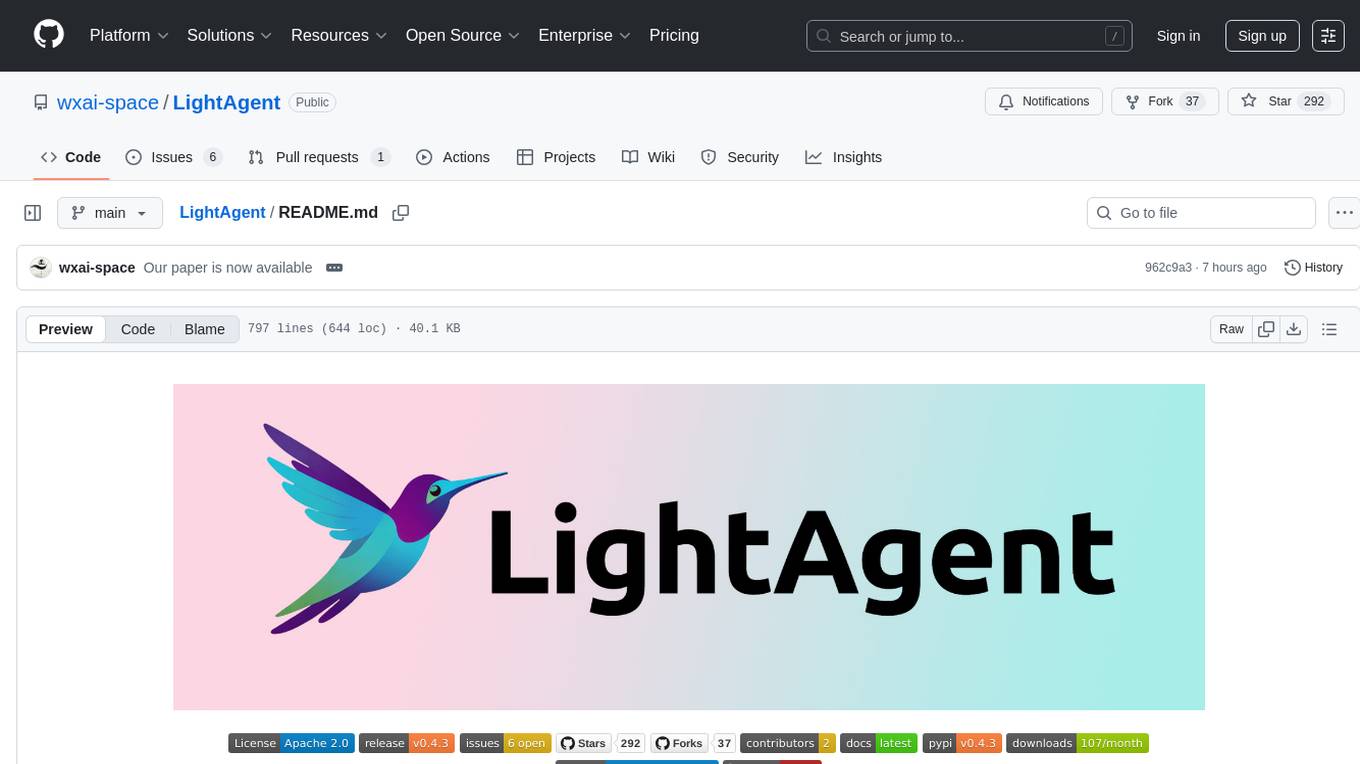
LightAgent
LightAgent is a lightweight, open-source Agentic AI development framework with memory, tools, and a tree of thought. It supports multi-agent collaboration, autonomous learning, tool integration, complex task handling, and multi-model support. It also features a streaming API, tool generator, agent self-learning, adaptive tool mechanism, and more. LightAgent is designed for intelligent customer service, data analysis, automated tools, and educational assistance.
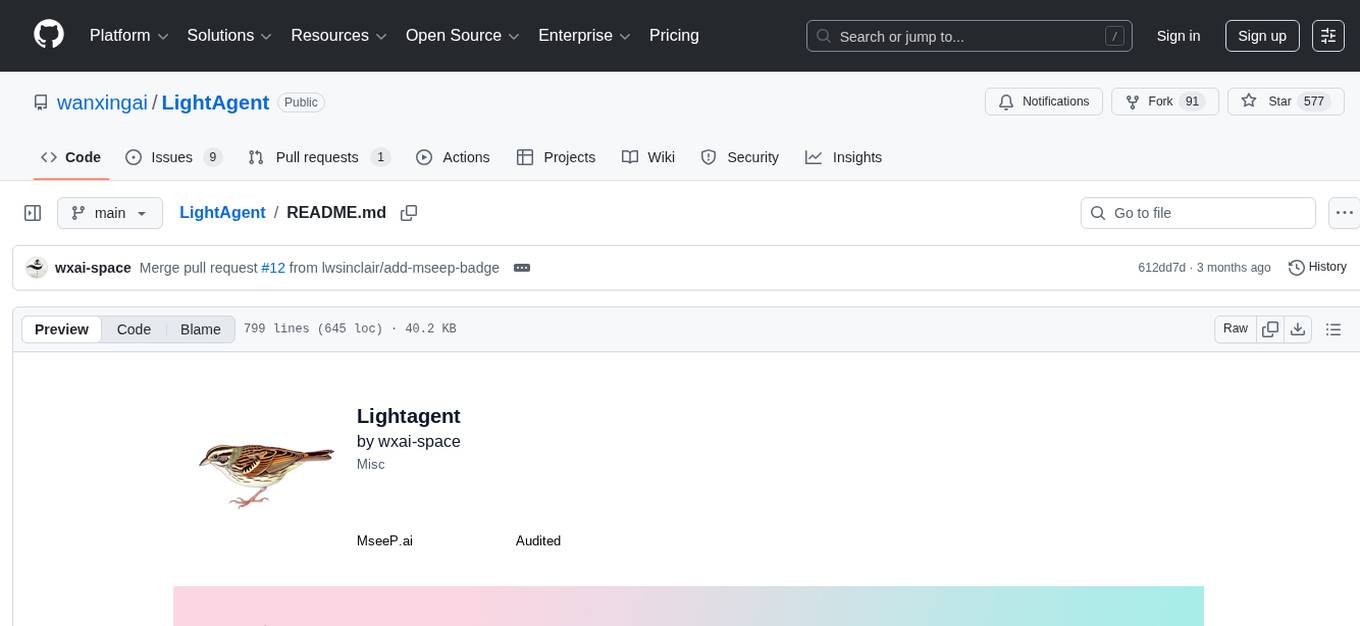
LightAgent
LightAgent is a lightweight, open-source active Agentic AI development framework with memory, tools, and a tree of thought. It supports multi-agent collaboration, autonomous learning, tool integration, complex goals, and multi-model support. It enables simpler self-learning agents, seamless integration with major chat frameworks, and quick tool generation. LightAgent also supports memory modules, tool integration, tree of thought planning, multi-agent collaboration, streaming API, agent self-learning, Langfuse log tracking, and agent assessment. It is compatible with various large models and offers features like intelligent customer service, data analysis, automated tools, and educational assistance.
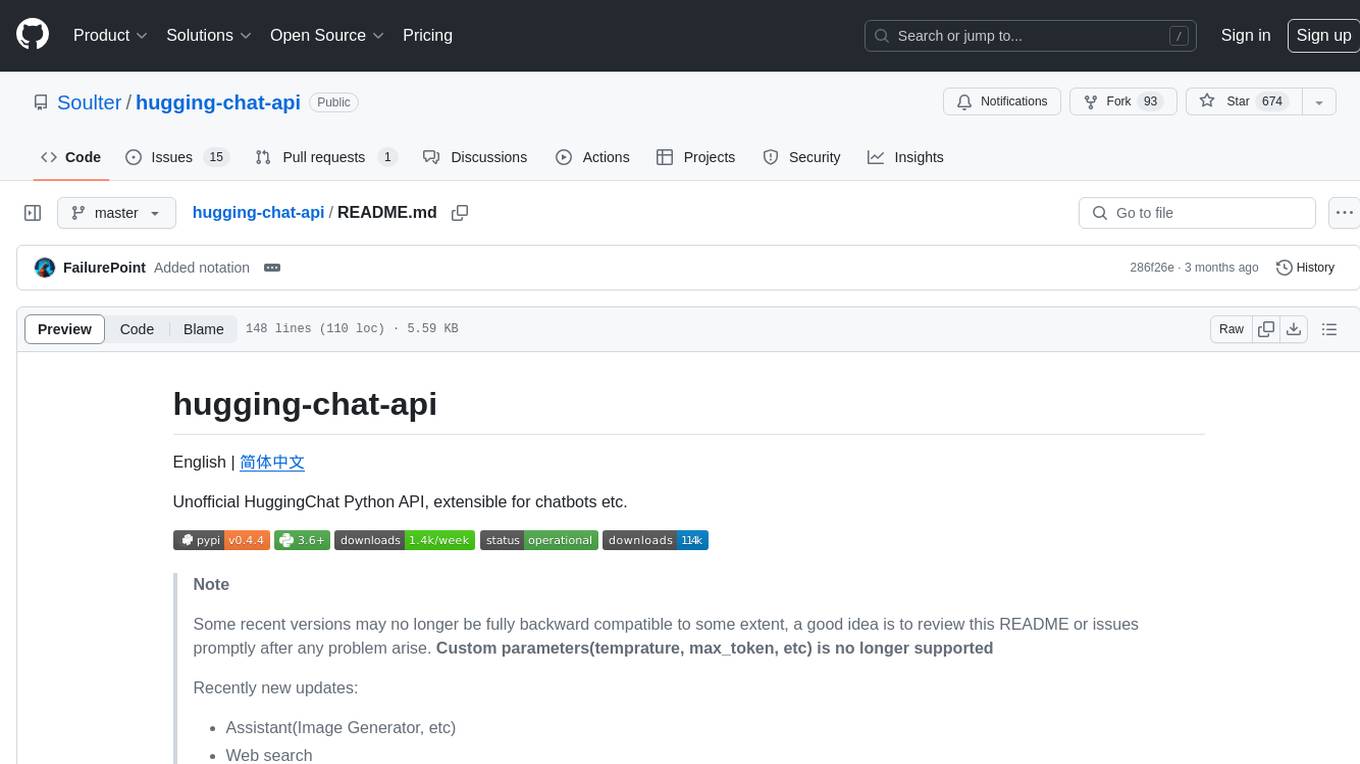
hugging-chat-api
Unofficial HuggingChat Python API for creating chatbots, supporting features like image generation, web search, memorizing context, and changing LLMs. Users can log in, chat with the ChatBot, perform web searches, create new conversations, manage conversations, switch models, get conversation info, use assistants, and delete conversations. The API also includes a CLI mode with various commands for interacting with the tool. Users are advised not to use the application for high-stakes decisions or advice and to avoid high-frequency requests to preserve server resources.
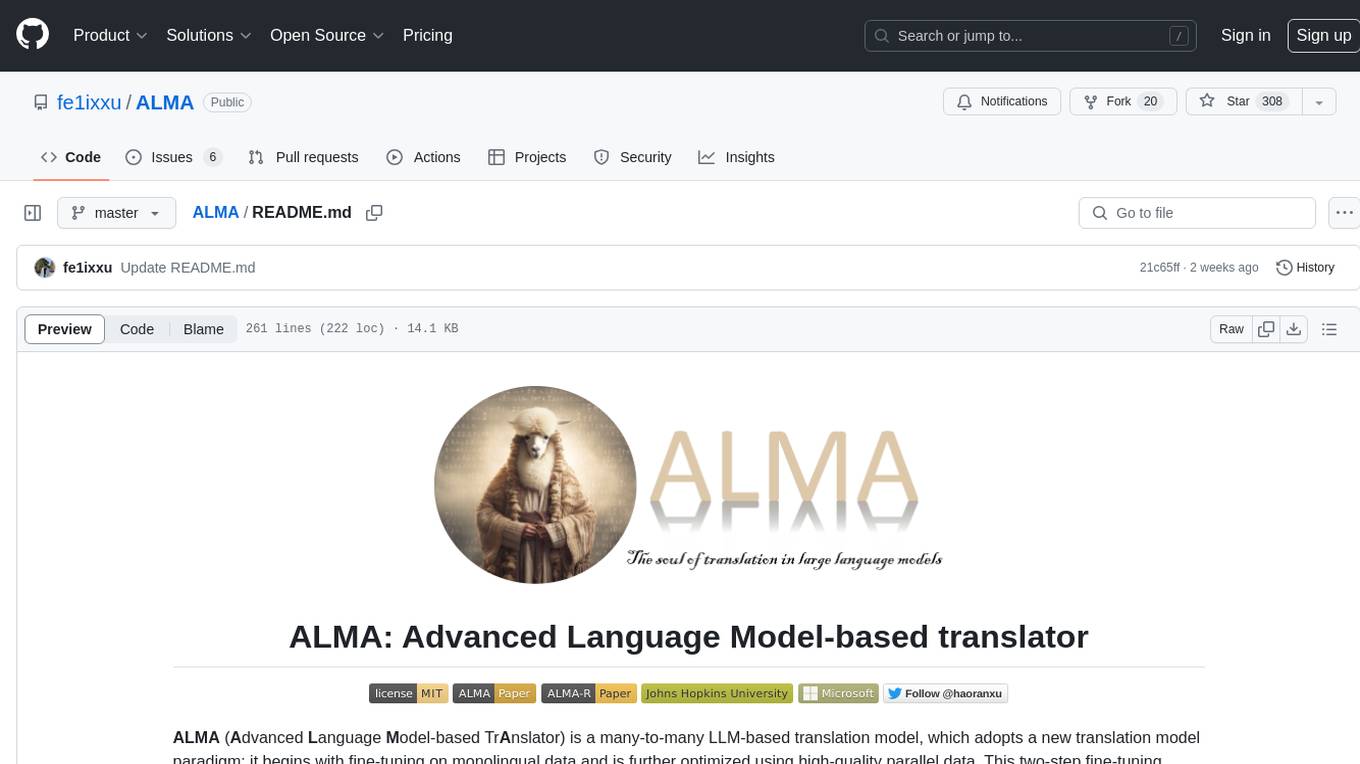
ALMA
ALMA (Advanced Language Model-based Translator) is a many-to-many LLM-based translation model that utilizes a two-step fine-tuning process on monolingual and parallel data to achieve strong translation performance. ALMA-R builds upon ALMA models with LoRA fine-tuning and Contrastive Preference Optimization (CPO) for even better performance, surpassing GPT-4 and WMT winners. The repository provides ALMA and ALMA-R models, datasets, environment setup, evaluation scripts, training guides, and data information for users to leverage these models for translation tasks.
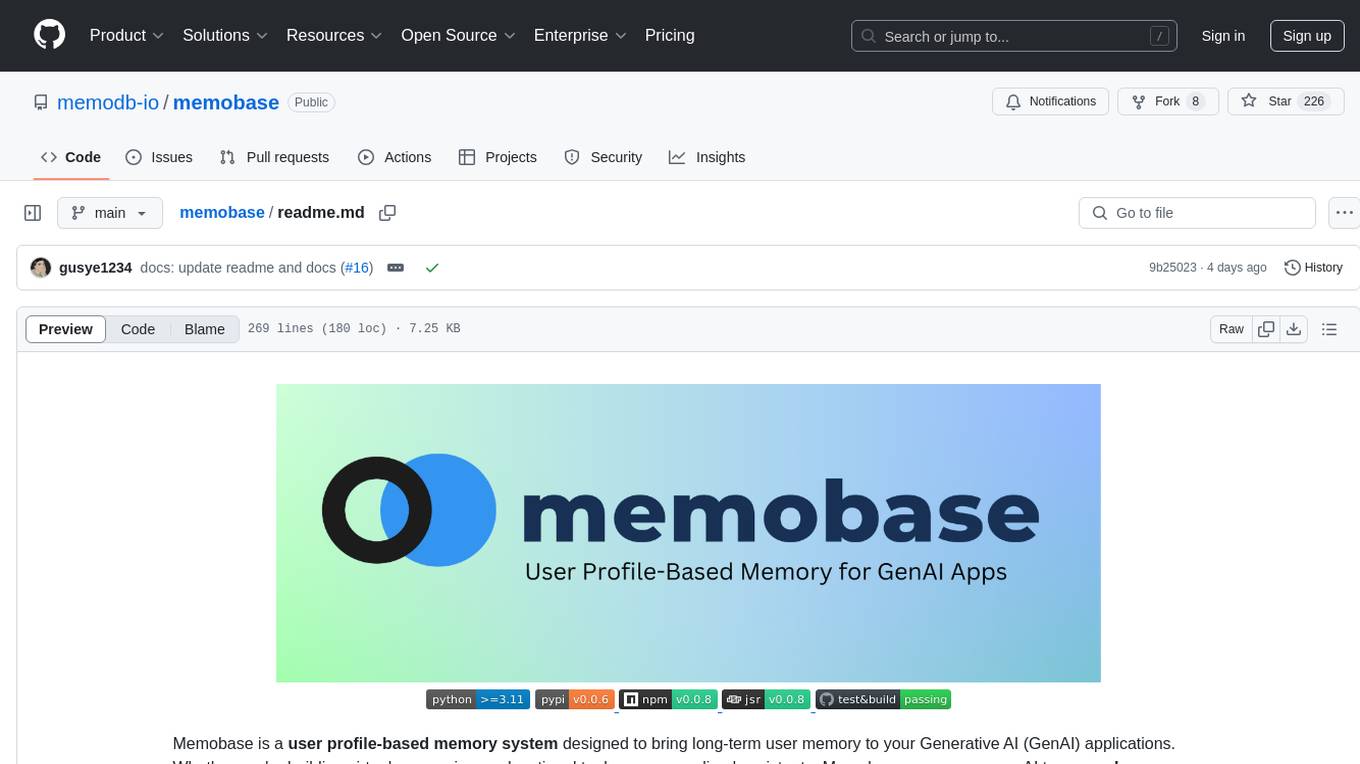
memobase
Memobase is a user profile-based memory system designed to enhance Generative AI applications by enabling them to remember, understand, and evolve with users. It provides structured user profiles, scalable profiling, easy integration with existing LLM stacks, batch processing for speed, and is production-ready. Users can manage users, insert data, get memory profiles, and track user preferences and behaviors. Memobase is ideal for applications that require user analysis, tracking, and personalized interactions.
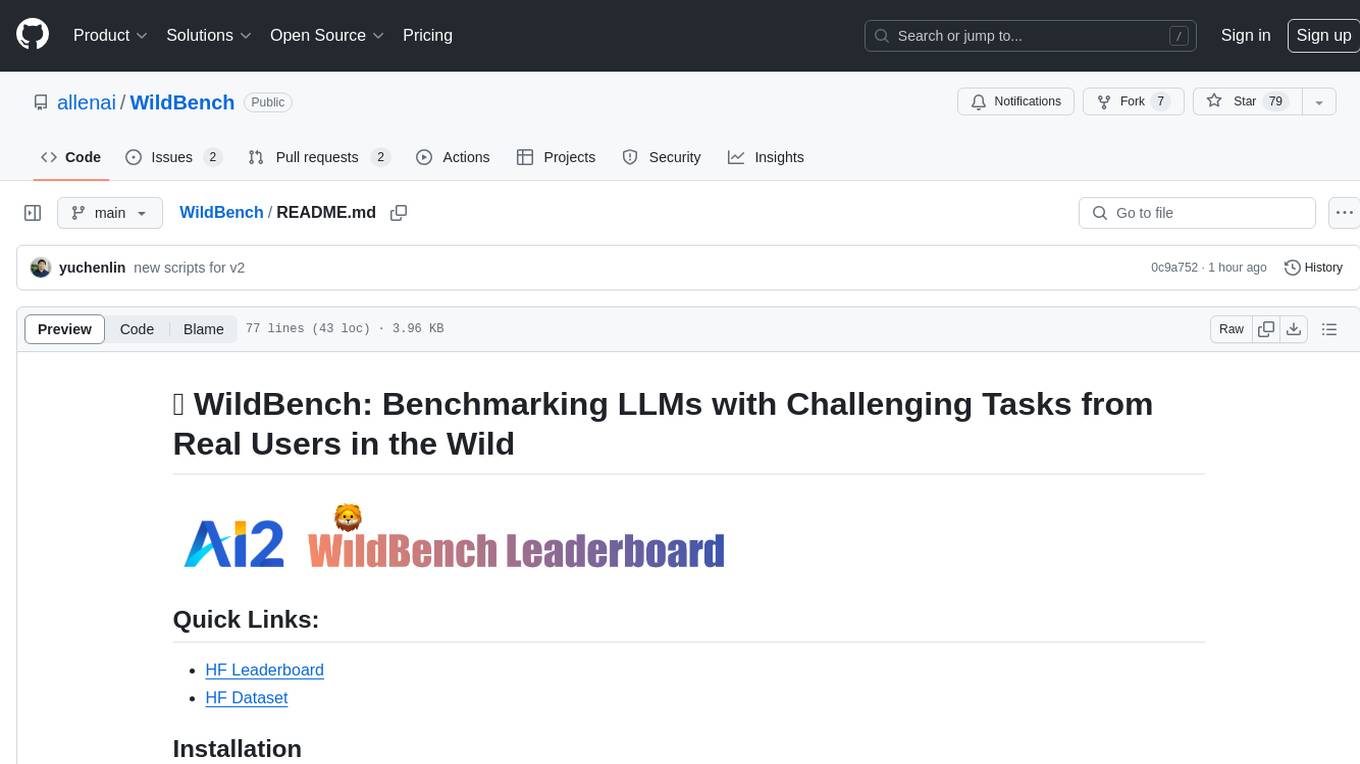
WildBench
WildBench is a tool designed for benchmarking Large Language Models (LLMs) with challenging tasks sourced from real users in the wild. It provides a platform for evaluating the performance of various models on a range of tasks. Users can easily add new models to the benchmark by following the provided guidelines. The tool supports models from Hugging Face and other APIs, allowing for comprehensive evaluation and comparison. WildBench facilitates running inference and evaluation scripts, enabling users to contribute to the benchmark and collaborate on improving model performance.
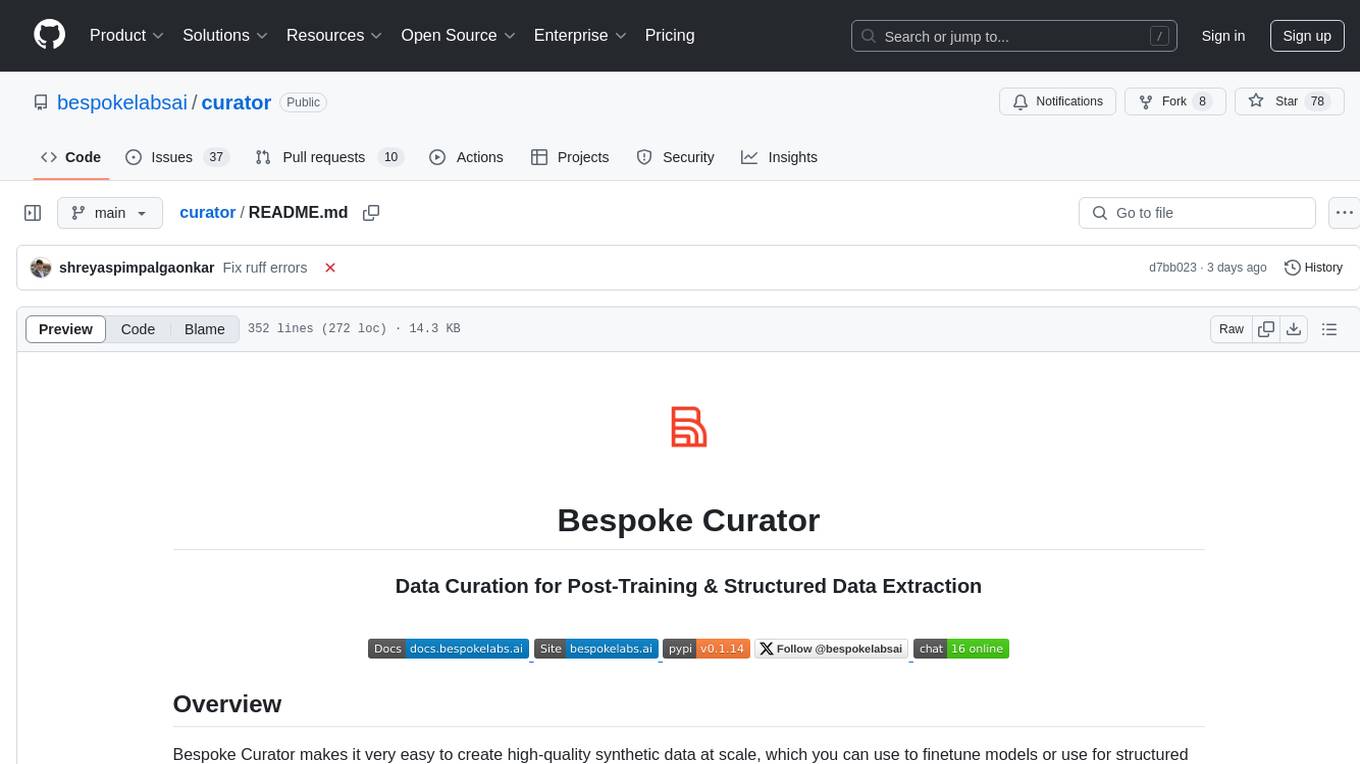
curator
Bespoke Curator is an open-source tool for data curation and structured data extraction. It provides a Python library for generating synthetic data at scale, with features like programmability, performance optimization, caching, and integration with HuggingFace Datasets. The tool includes a Curator Viewer for dataset visualization and offers a rich set of functionalities for creating and refining data generation strategies.
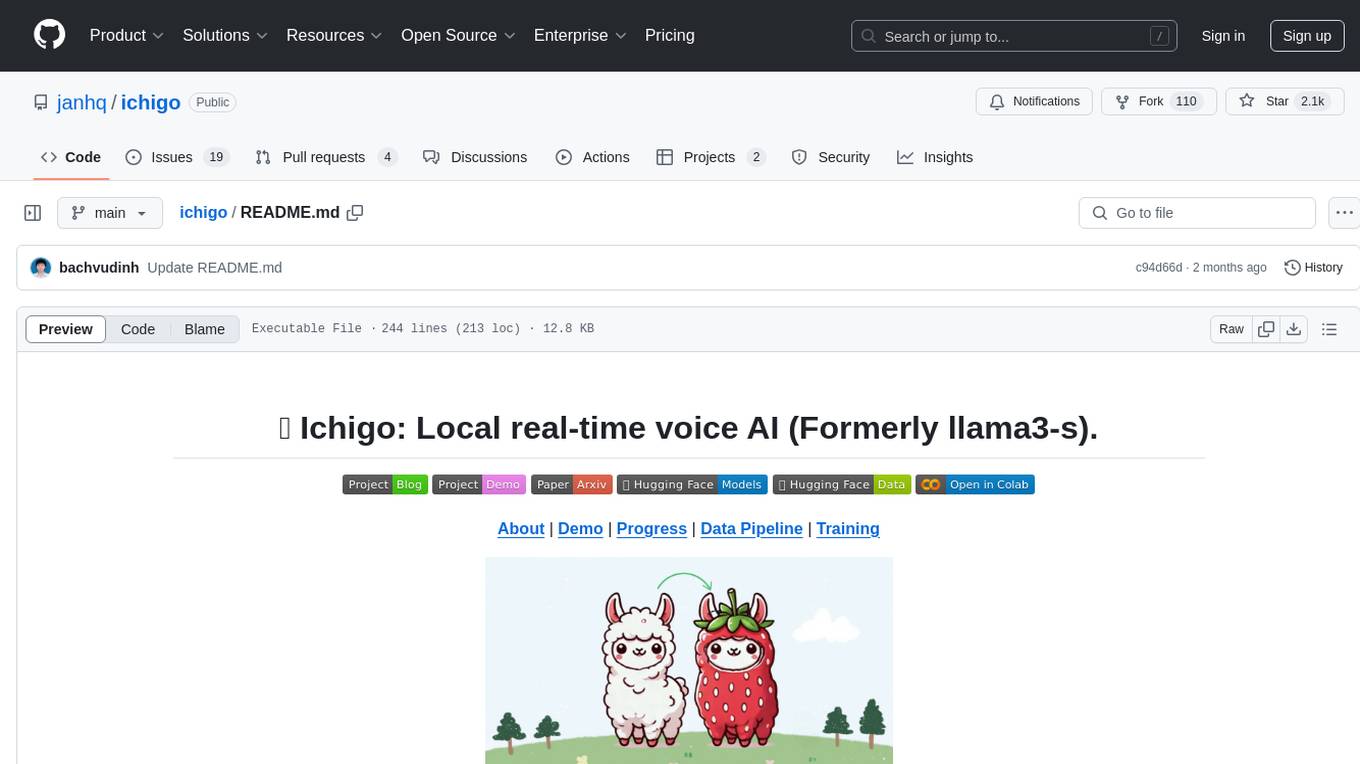
ichigo
Ichigo is a local real-time voice AI tool that uses an early fusion technique to extend a text-based LLM to have native 'listening' ability. It is an open research experiment with improved multiturn capabilities and the ability to refuse processing inaudible queries. The tool is designed for open data, open weight, on-device Siri-like functionality, inspired by Meta's Chameleon paper. Ichigo offers a web UI demo and Gradio web UI for users to interact with the tool. It has achieved enhanced MMLU scores, stronger context handling, advanced noise management, and improved multi-turn capabilities for a robust user experience.
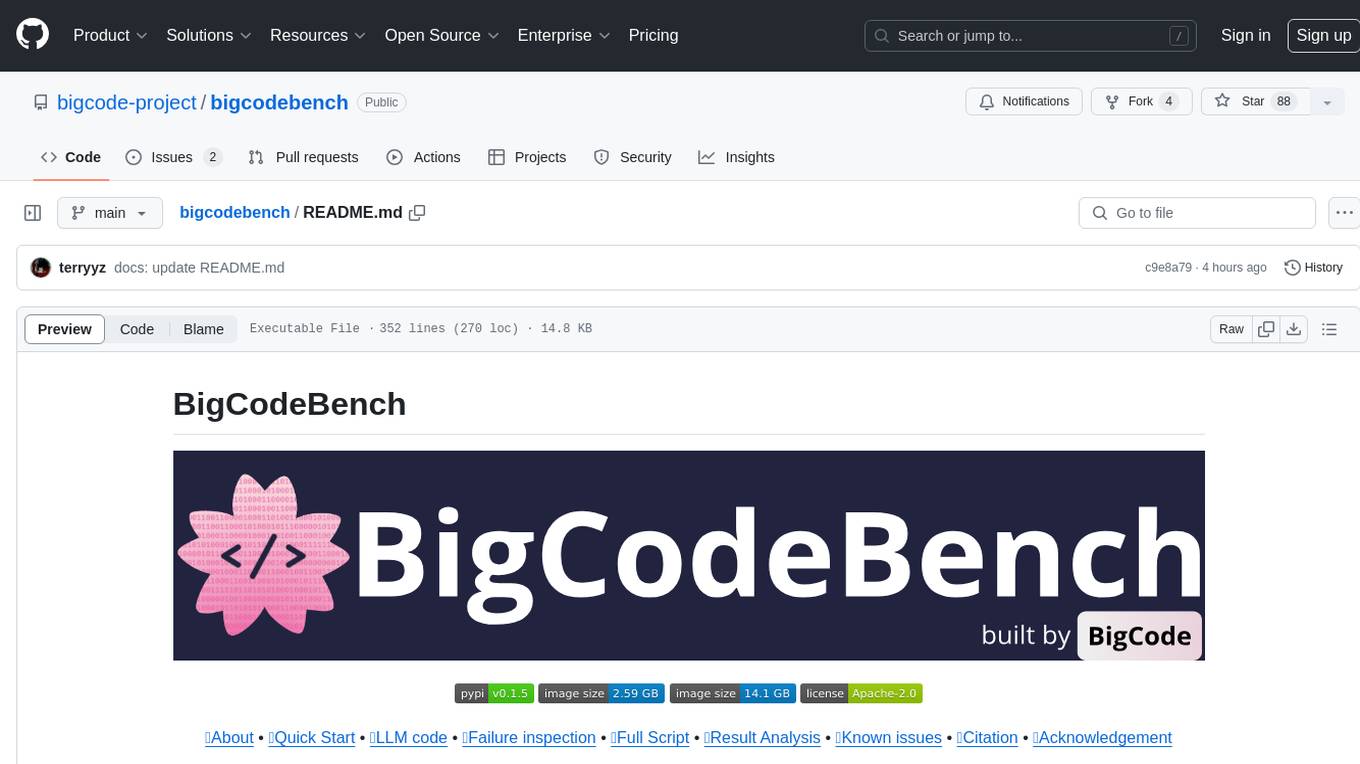
bigcodebench
BigCodeBench is an easy-to-use benchmark for code generation with practical and challenging programming tasks. It aims to evaluate the true programming capabilities of large language models (LLMs) in a more realistic setting. The benchmark is designed for HumanEval-like function-level code generation tasks, but with much more complex instructions and diverse function calls. BigCodeBench focuses on the evaluation of LLM4Code with diverse function calls and complex instructions, providing precise evaluation & ranking and pre-generated samples to accelerate code intelligence research. It inherits the design of the EvalPlus framework but differs in terms of execution environment and test evaluation.
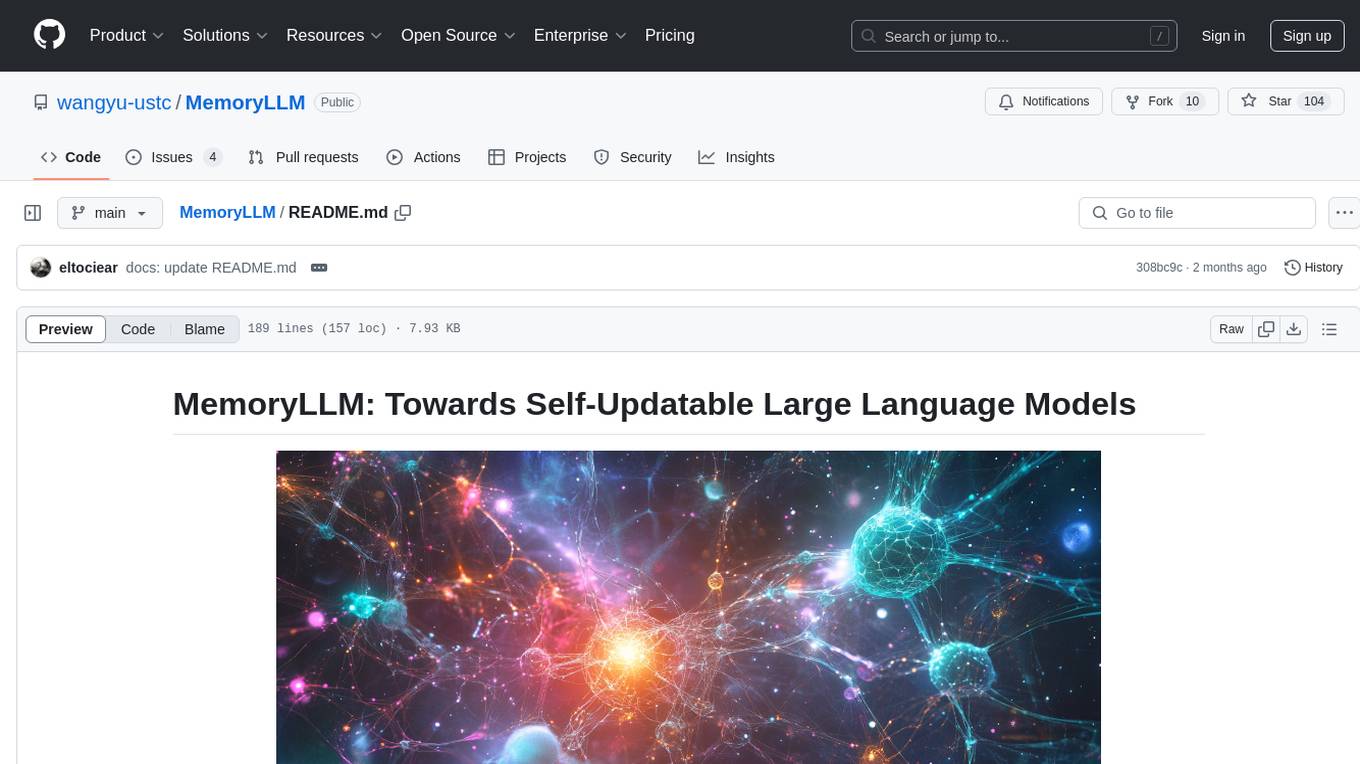
MemoryLLM
MemoryLLM is a large language model designed for self-updating capabilities. It offers pretrained models with different memory capacities and features, such as chat models. The repository provides training code, evaluation scripts, and datasets for custom experiments. MemoryLLM aims to enhance knowledge retention and performance on various natural language processing tasks.
For similar tasks

qa-mdt
This repository provides an implementation of QA-MDT, integrating state-of-the-art models for music generation. It offers a Quality-Aware Masked Diffusion Transformer for enhanced music generation. The code is based on various repositories like AudioLDM, PixArt-alpha, MDT, AudioMAE, and Open-Sora. The implementation allows for training and fine-tuning the model with different strategies and datasets. The repository also includes instructions for preparing datasets in LMDB format and provides a script for creating a toy LMDB dataset. The model can be used for music generation tasks, with a focus on quality injection to enhance the musicality of generated music.

OpenMusic
OpenMusic is a repository providing an implementation of QA-MDT, a Quality-Aware Masked Diffusion Transformer for music generation. The code integrates state-of-the-art models and offers training strategies for music generation. The repository includes implementations of AudioLDM, PixArt-alpha, MDT, AudioMAE, and Open-Sora. Users can train or fine-tune the model using different strategies and datasets. The model is well-pretrained and can be used for music generation tasks. The repository also includes instructions for preparing datasets, training the model, and performing inference. Contact information is provided for any questions or suggestions regarding the project.
For similar jobs
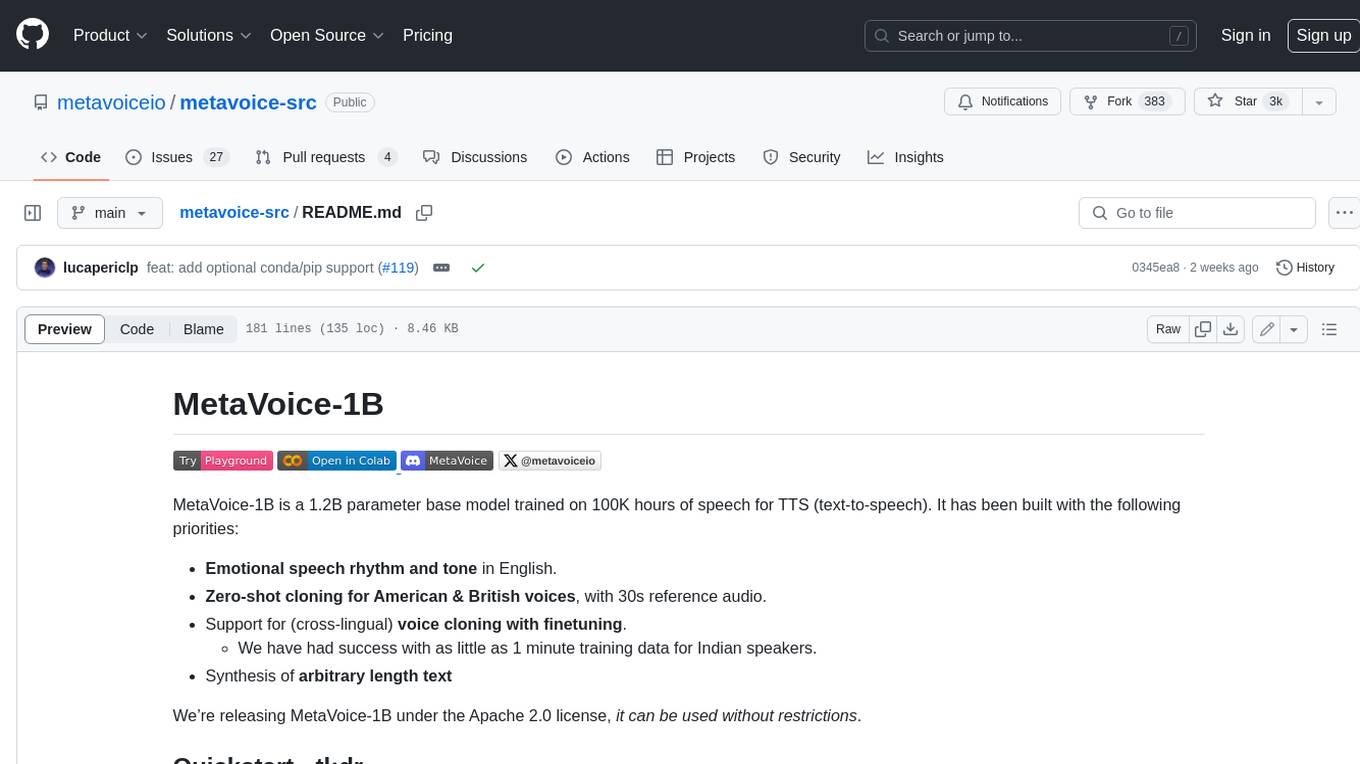
metavoice-src
MetaVoice-1B is a 1.2B parameter base model trained on 100K hours of speech for TTS (text-to-speech). It has been built with the following priorities: * Emotional speech rhythm and tone in English. * Zero-shot cloning for American & British voices, with 30s reference audio. * Support for (cross-lingual) voice cloning with finetuning. * We have had success with as little as 1 minute training data for Indian speakers. * Synthesis of arbitrary length text
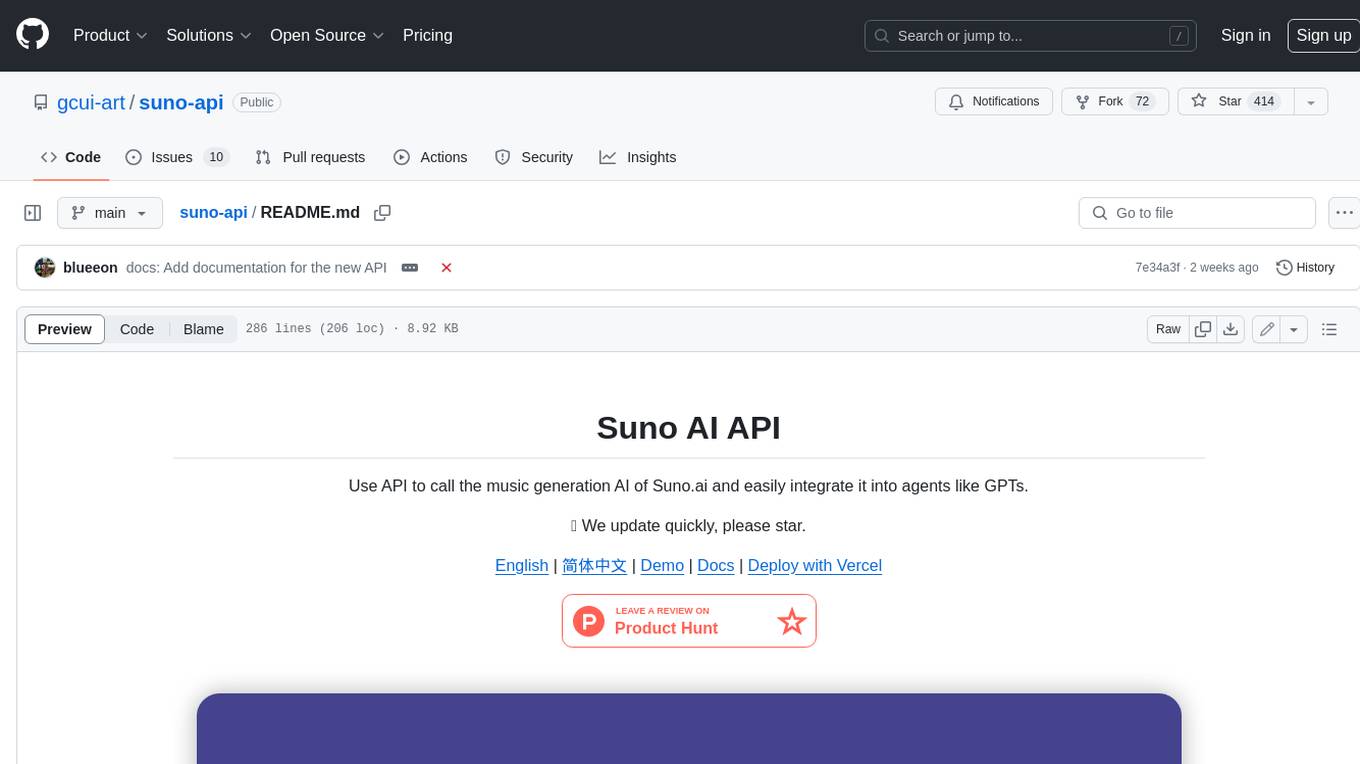
suno-api
Suno AI API is an open-source project that allows developers to integrate the music generation capabilities of Suno.ai into their own applications. The API provides a simple and convenient way to generate music, lyrics, and other audio content using Suno.ai's powerful AI models. With Suno AI API, developers can easily add music generation functionality to their apps, websites, and other projects.
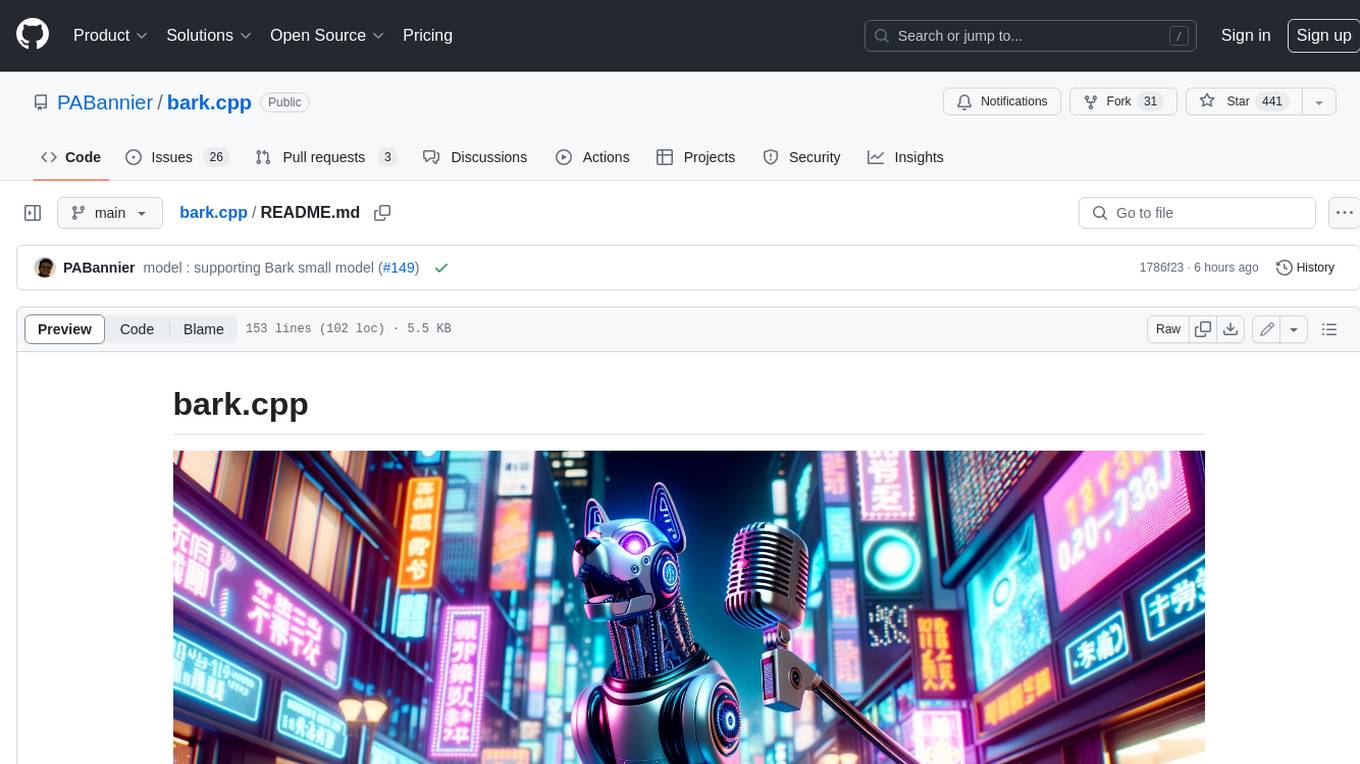
bark.cpp
Bark.cpp is a C/C++ implementation of the Bark model, a real-time, multilingual text-to-speech generation model. It supports AVX, AVX2, and AVX512 for x86 architectures, and is compatible with both CPU and GPU backends. Bark.cpp also supports mixed F16/F32 precision and 4-bit, 5-bit, and 8-bit integer quantization. It can be used to generate realistic-sounding audio from text prompts.
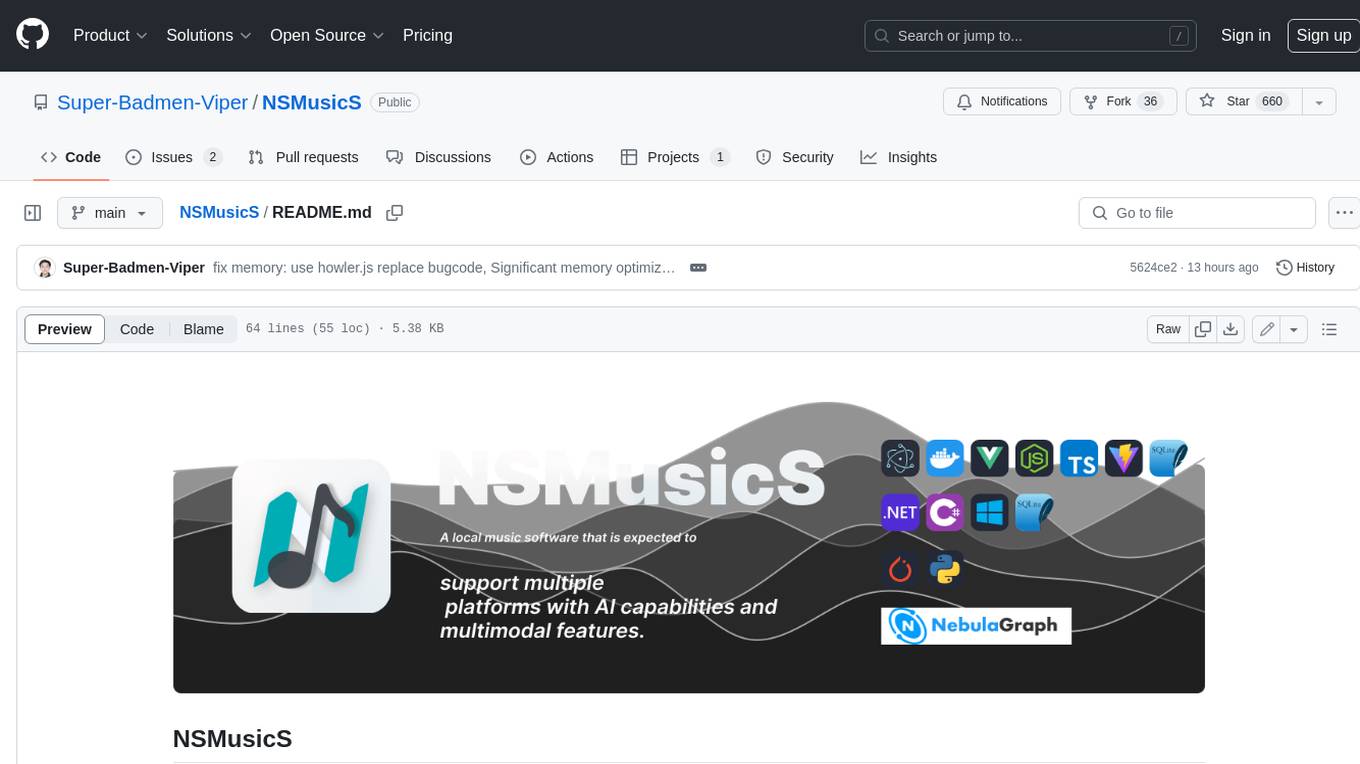
NSMusicS
NSMusicS is a local music software that is expected to support multiple platforms with AI capabilities and multimodal features. The goal of NSMusicS is to integrate various functions (such as artificial intelligence, streaming, music library management, cross platform, etc.), which can be understood as similar to Navidrome but with more features than Navidrome. It wants to become a plugin integrated application that can almost have all music functions.
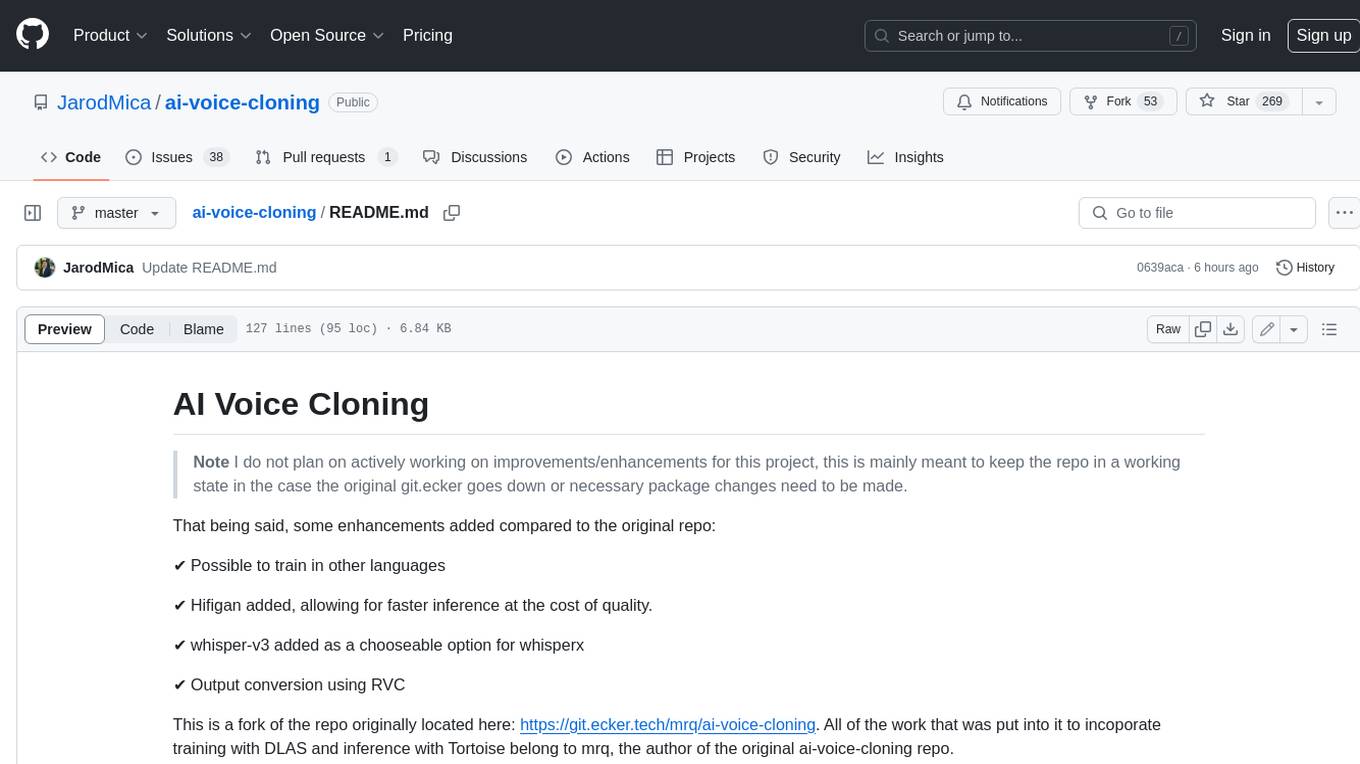
ai-voice-cloning
This repository provides a tool for AI voice cloning, allowing users to generate synthetic speech that closely resembles a target speaker's voice. The tool is designed to be user-friendly and accessible, with a graphical user interface that guides users through the process of training a voice model and generating synthetic speech. The tool also includes a variety of features that allow users to customize the generated speech, such as the pitch, volume, and speaking rate. Overall, this tool is a valuable resource for anyone interested in creating realistic and engaging synthetic speech.
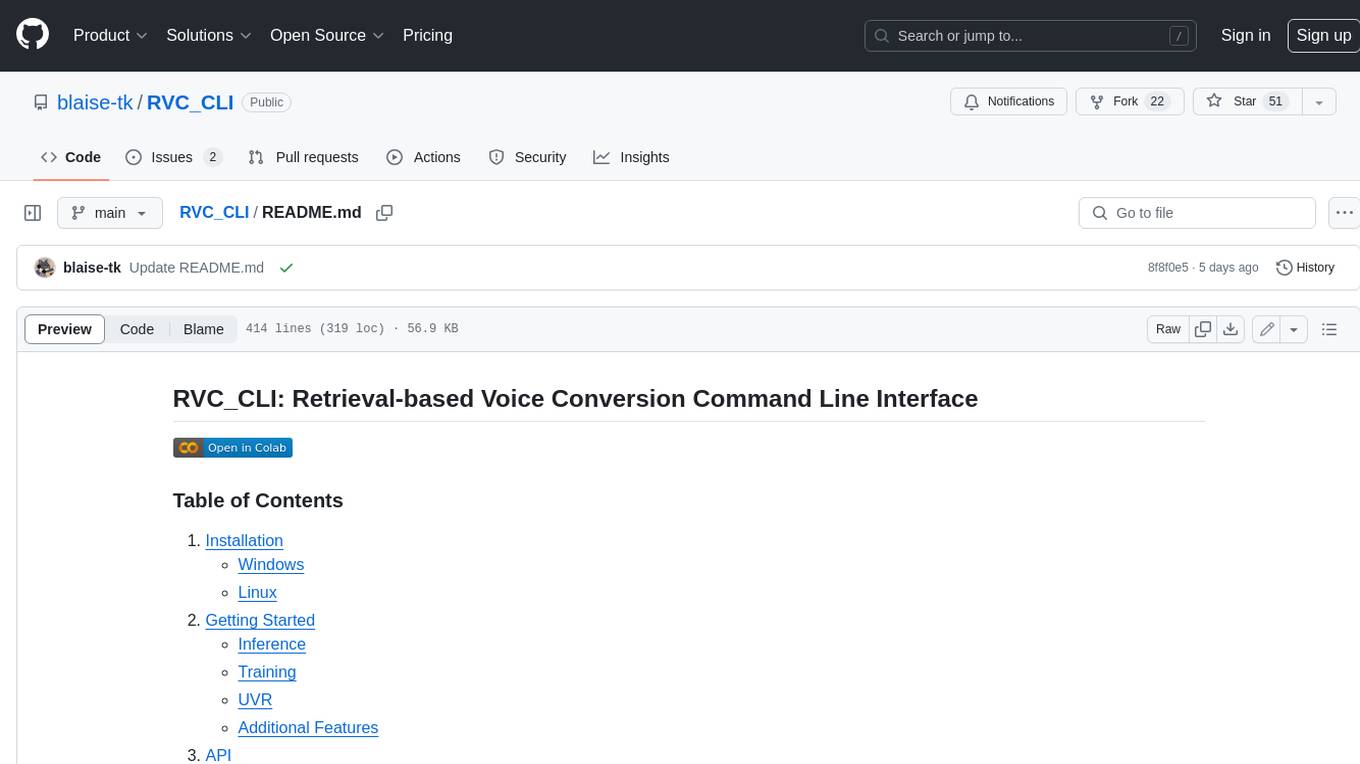
RVC_CLI
**RVC_CLI: Retrieval-based Voice Conversion Command Line Interface** This command-line interface (CLI) provides a comprehensive set of tools for voice conversion, enabling you to modify the pitch, timbre, and other characteristics of audio recordings. It leverages advanced machine learning models to achieve realistic and high-quality voice conversions. **Key Features:** * **Inference:** Convert the pitch and timbre of audio in real-time or process audio files in batch mode. * **TTS Inference:** Synthesize speech from text using a variety of voices and apply voice conversion techniques. * **Training:** Train custom voice conversion models to meet specific requirements. * **Model Management:** Extract, blend, and analyze models to fine-tune and optimize performance. * **Audio Analysis:** Inspect audio files to gain insights into their characteristics. * **API:** Integrate the CLI's functionality into your own applications or workflows. **Applications:** The RVC_CLI finds applications in various domains, including: * **Music Production:** Create unique vocal effects, harmonies, and backing vocals. * **Voiceovers:** Generate voiceovers with different accents, emotions, and styles. * **Audio Editing:** Enhance or modify audio recordings for podcasts, audiobooks, and other content. * **Research and Development:** Explore and advance the field of voice conversion technology. **For Jobs:** * Audio Engineer * Music Producer * Voiceover Artist * Audio Editor * Machine Learning Engineer **AI Keywords:** * Voice Conversion * Pitch Shifting * Timbre Modification * Machine Learning * Audio Processing **For Tasks:** * Convert Pitch * Change Timbre * Synthesize Speech * Train Model * Analyze Audio
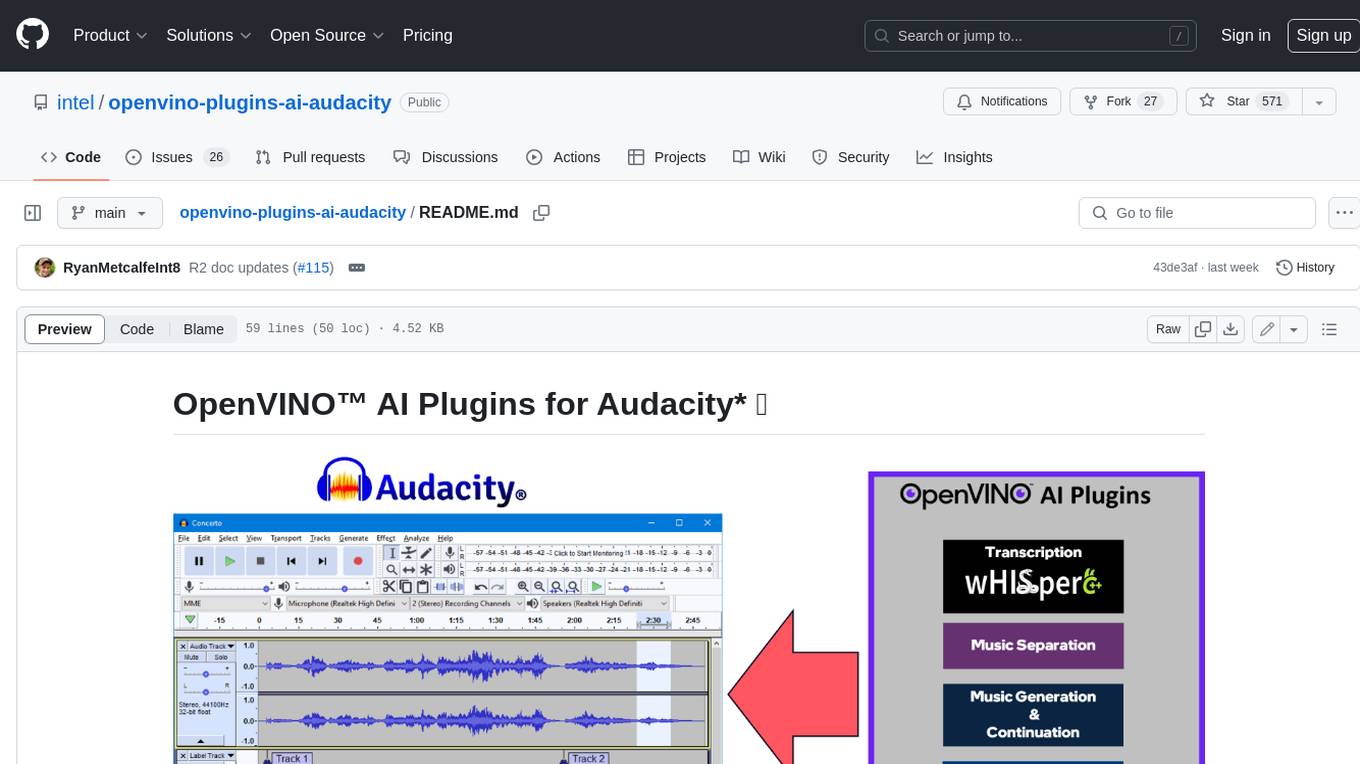
openvino-plugins-ai-audacity
OpenVINO™ AI Plugins for Audacity* are a set of AI-enabled effects, generators, and analyzers for Audacity®. These AI features run 100% locally on your PC -- no internet connection necessary! OpenVINO™ is used to run AI models on supported accelerators found on the user's system such as CPU, GPU, and NPU. * **Music Separation**: Separate a mono or stereo track into individual stems -- Drums, Bass, Vocals, & Other Instruments. * **Noise Suppression**: Removes background noise from an audio sample. * **Music Generation & Continuation**: Uses MusicGen LLM to generate snippets of music, or to generate a continuation of an existing snippet of music. * **Whisper Transcription**: Uses whisper.cpp to generate a label track containing the transcription or translation for a given selection of spoken audio or vocals.
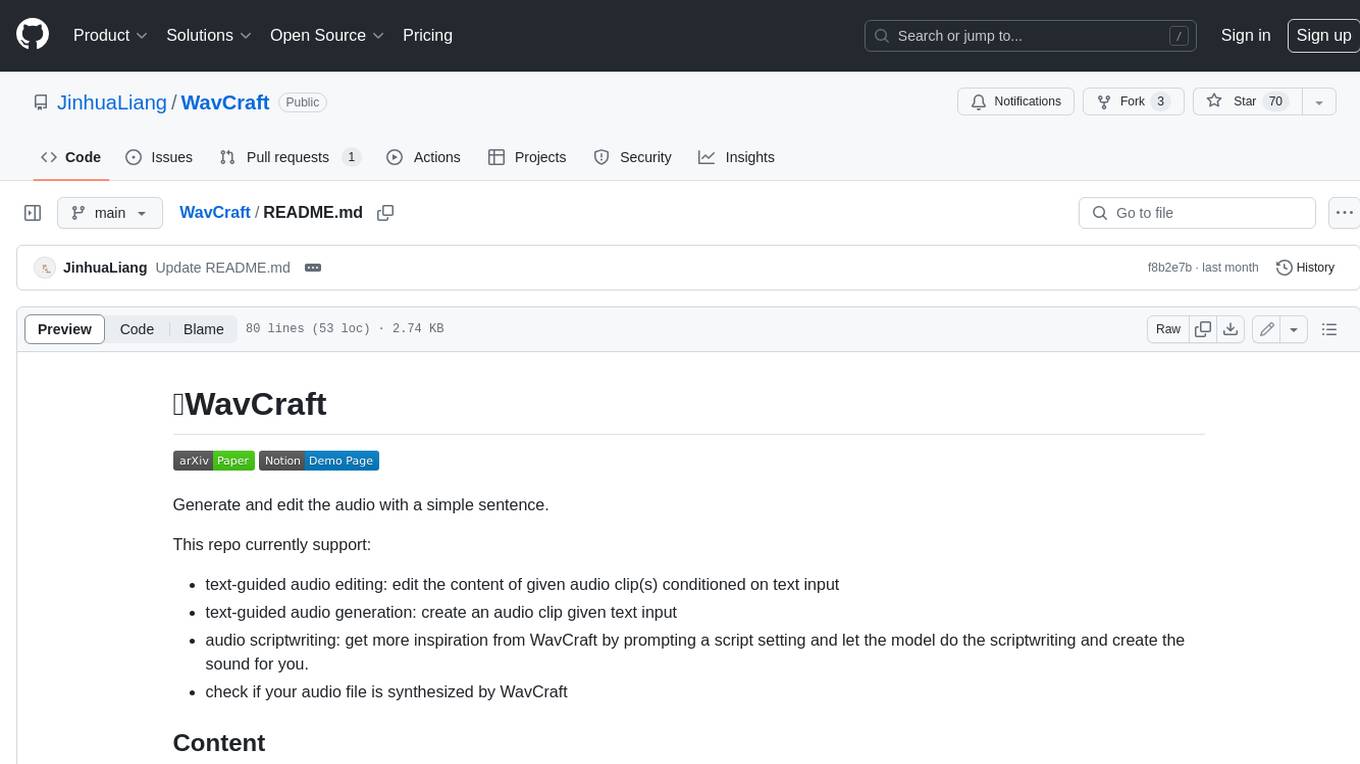
WavCraft
WavCraft is an LLM-driven agent for audio content creation and editing. It applies LLM to connect various audio expert models and DSP function together. With WavCraft, users can edit the content of given audio clip(s) conditioned on text input, create an audio clip given text input, get more inspiration from WavCraft by prompting a script setting and let the model do the scriptwriting and create the sound, and check if your audio file is synthesized by WavCraft.







